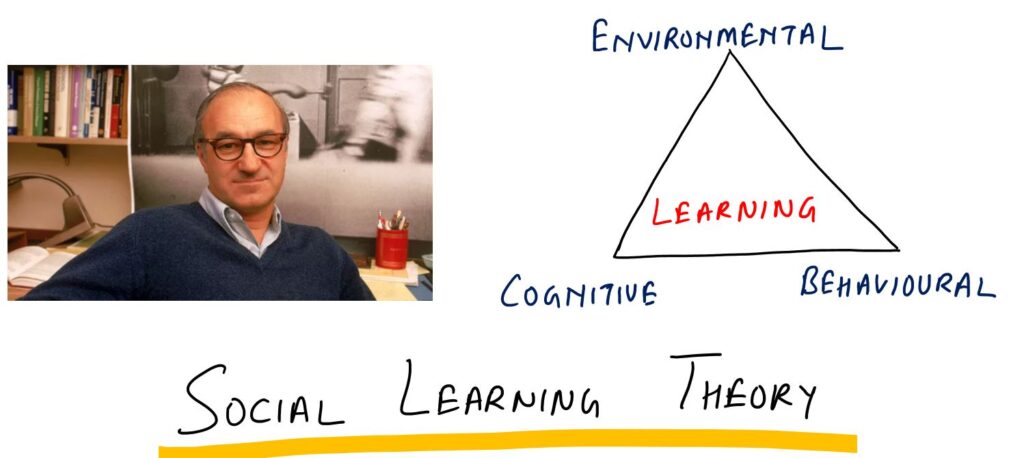Social Learning Theory – Albert Bandura
Albert Bandura’s insights give us a good grasp of how we learn, showing that it’s not just one thing but a mix of factors. He points out how important watching and wanting to learn are, which are key ideas in Social Learning Theory.
Albert Bandura is known for his Social Learning Theory. He is quite different from other learning theorists who look at learning as a direct result of conditioning, reinforcement, and punishment. Bandura asserts that most human behavior is learned through observation, imitation, and modeling.
A brief introduction of Albert Bandura along with explanation of his Social Learning Theory is given below.

Albert Bandura
Albert Bandura is renowned for his research on children’s observational learning of aggressive behavior. He conducted experiments where children witnessed adults acting aggressively toward a doll, and subsequently, the children imitated these actions when given dolls to play with. Bandura went beyond mere observation, exploring “verbal” instructional models, where clear explanations and descriptions enhanced learning. This is akin to when someone patiently explains a concept, facilitating learning.
Furthermore, he delved into “symbolic” models, which included fictional and non-fictional characters in various media forms like movies, TV shows, online content, and books. This revealed that students could learn from these sources by observing how characters reacted and felt, subsequently applying these lessons to real-life situations. Bandura’s work underscores the power of observation and instruction in shaping human behavior, extending beyond direct interactions to encompass a wide range of media and instructional methods.
Thus, the human behaviour and learning is determined by the relationship between cognitive factors, environmental factors, and behavior factors.
Bandura showed that observational learning can occur without the learner demonstrating any new behavior. In other words, you can observe, imitate, or model something but you might not learn it.

Steps of Social Learning Theory
Albert Bandura explored the question of what needs to happen for an observable behavior to be learned (in addition to observation) and cited 4 necessary steps: attention, retention, reproduction, and motivation.
Observation + 4 Necessary Steps = Learning
1. Attention
The learner must focus on the model or situation. Distractions can hinder learning, and the more captivating or unique the model, the more attentive the learner will be. For instance, in a classroom, a student who pays close attention to an engaging teacher is more likely to learn effectively.
2. Retention
How information is stored matters. Effective retention might involve using mnemonic devices, taking notes, or applying the learning to real-life situations. For example, a student who takes thorough notes during a lecture is more likely to retain the information.
3. Motor Reproduction
This step depends on attention and retention. After these initial stages, the learner begins to perform the observed behavior. With practice, skills are refined. An example could be a novice pianist who diligently practices, improving their ability over time.
4. Motivation
The final step is motivation, influenced by reinforcement and punishment. If a student observes someone being rewarded for their behavior, they are more likely to emulate it. Conversely, if they witness punishment or a lack of attention for a behavior, they may cease it. For instance, a child who observes a classmate being praised for helping others is motivated to do the same to receive positive reinforcement.
UGC NET Questions for Practice (Social Learning Theory – Albert Bandura)
1.) Which theory and theorist are associated with learning through observation? (UGC NET 21st Mar 2023 Morning)
(A) Behaviourist theory, Skinner
(B) Constructivist theory, Piaget
(C) Social cognitive theory, Bandura
(D) Socio cultural theory, Vygotsky
2.) Which of the following processes are for observational learning proposed by Bandura? (UGC NET 06th Mar 2023 Evening)
A. Attention
B. Adaptation
C. Retention (Memory)
D. Behavioural rehearsal
E. Motivation
Choose the correct answer from the options given below:
(A) A, C and D only
(B) B, C and E only
(C) A, B and D only
(D) A, C, D and E only
3.) Which of the following are the elements of observation learning (one of the outcomes of Bandura’s Social Cognitive theory of learning)? (UGC NET 28th Mar 2023 Evening)
A. Attention
B. Retention
C. Articulation
D. Production
E. Motivation
Choose the correct answer from the options given below:
(A) A, B and D only
(B) C and E only
(C) A, B, D and E only
(D) B, C and D only
4.) Match the List I with List II: (UGC NET 24 Dec Morning 2021)
List I
a. Classical conditioning
b. Operant conditioning
c. Social learning theory
d. Constructivism
List II
i. Albert Bandura
ii. Ivan Pavlov
iii. Lev Vygotsky
iv. B. F. Skinner
Choose the correct answer from the options given below:
Codes
(A) a‐ i, b‐ iii, c‐ ii, d‐ iv
(B) a‐ iii, b‐ ii, c‐ iv, d‐ i
(C) a‐ ii, b‐ iv, c‐ i, d‐ iii
(D) a‐ iv, b‐ i, c‐ iii, d‐ ii
Answers
1. C
2. D
3. C
4. C



